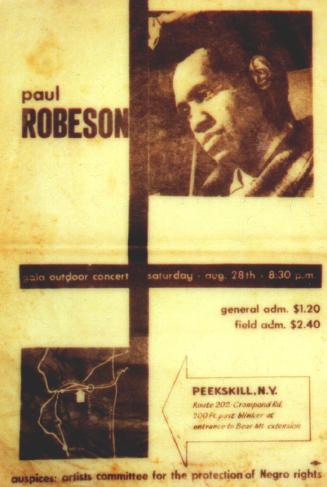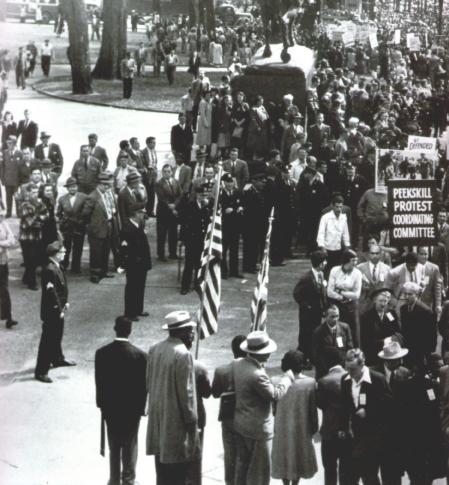THE PEEKSKILL STORY (PARTS 1 & 2)
(MARIO CASETTA) (1949)
Tune: "Hold the Line" (LEE HAYS/PETE SEEGER)

Poster announcing the Peekskill concert




On July 8, 1949, former People's Songs Inc. members met in New York under a new umbrella organization, People's Artists. It was not as ambitious as People's Songs; it primarily served to sponsor hootenannies and concerts, book artists and encourage songwriters. Pete Seeger, Irwin Silber and Betty Sanders were the primary forces behind People's Artists: Seeger later scaled back his involvement when the Weavers began achieving popular success.People's Artists booked a major concert for August 27, 1949 at Lakeland Picnic Grounds, a former golf course north of Peekskill, New York. Seeger and other People's Artists were tapped to warm up the crowd for its featured act, Paul Robeson. Some questioned the wisdom of holding such an event in Peekskill, a notoriously reactionary community that harbored an active Ku Klux Klan chapter. Soon after the concert was announced, the local paper launched a vitriolic attack on Robeson and his political views. The Joint Veterans Council of Westchester County immediately began planning a parade just prior to the concer; most residents knew it was a setup.
Several hours before the show was to begin, novelist Howard Fast arrived at the resort to help set up the public address system. From out of nowhere, about 300 vigilantes brutally pelted Fast, his assistants and other early arrivers with rocks. Fighting its way to the stage, the mob broke chairs and burned songsheets. Police met other concertgoers up the road. telling them the program was cancelled.
Eager to stand its ground, People's Artists boldly rescheduled the concert for the following week. Expecting more potential for violence, People's Artists hired guards from several left-wing unions to protect the grounds. Between 20,000 and 25,000 persons came to Peekskill for the rescheduled concert: most came to show solidarity in the face of local hostility. It was probably the largest audience Seeger and Robeson had faced since the October 1948 Yankee Doodle Rally for Henry Wallace in New York's Madison Square Garden. The concert was held without incident; at its conclusion Westchester County deputies began directing departing traffic to a little-used access road away from the main entrance. It was a trap. Hundreds of angry residents viciously showered the cars with rocks; the police did nothing to stop them. More than 150 concertgoers were injured during the riot, many from flying glass.
Francis Dellorco, a Philadelphia artist who formerly produced filmstrips for People's Songs, captured the angry mob on a primitive wire recorder. "You can hear the crowd say. 'Hey, you white niggers, get back to Russia' and 'Jews, Jews, Jews'," Mario Casetta recalled. Within weeks of the incident, he began writing "The Peekskill Story." The production was hurriedly pieced together by Casetta and Tony Schwartz, a pioneer in magnetic tape recording. Howard Fast was the narrator: the singers were the Weavers - Seeger, Hays, Ronnie Gilbert and Fred Hellerman - a group primarily known through its appearances at hoots and on Oscar Brand's WNYC show. Hold the Line, a song by Lee Hays and Pete Seeger. was intermittently heard to advance the continuity and encourage a unified effort against rising native fascism. The Peekskill Story was released as Charter 502 in late September 1949. Despite its technical shortcomings, it remains a powerful, disturbing record.
RONALD D. COHEN & DAVE SAMUELSON, Songs For Political Action (accompanying book), Bear Family Records, 1996, p. 166.


The Peekskill riots were an unsubtle threat that drew leftists together. "The people in Peekskill were calling out to the rest of America," said Seeger, remembering his alarm. "Whenever you find a Commie around, do something about it -- don't wait for the long process of the law, do it right away, because our country is in danger."
Two weeks after the event, Pete and some friends had worked up a new song, "Hold the Line"....
Which line was really held? The one separating radicals from the rest of America? The Party's? Or perhaps the barrier separating civil liberties from mob rule -- this too had broken down.
At first glance, "Hold the Line" seems a bluff. The cold war was heating up, and only five months later the junior senator from Wisconsin, Joe McCarthy, would begin waving his list of secret Communists. But Seeger was terribly serious about the song; optimism and perseverance were the bedrock of his art, a music born of political adversity. His songs were blunt weapons, but he lanced them with all his might.
DAVID DUNAWAY, How Can I Keep From Singing: Pete Seeger, New York, NY, 1990, p. 22.


Let me tell you the story of a line that was held
And many men and women whose courage we know well
As they held the line at Peekskill on that lone September day
We will hold the line forever 'til the people have their way.Spoken (Howard Fast):
My name is Howard Fast. I'm here to tell you the story of Peekskill. You see, there are actually two Peekskills. Two concerts. Two Fascist attacks. And I was at both. You won't get the true story from the daily press or the radio, so we're putting it on record for you now. Here are the facts.Spoken (woman):
You are invited to a summer concert with Paul Robeson. Pete Seeger, Hope Foye, Joan Schlesinger and George Walker, presented hy People's Artists, for the benefit of the Harlem Chapter of the Civil Rights Congress, Sunday, August 27, 1949, at the Lakeland Picnic Grove, Peekskill, New York.Howard Fast:
More facts. The Klan elements in Westchester County threatened violence. Police protection was asked. Four deputies showed up to watch 700 so called veterans attack the early picnickers. These 700 hoodlums closed the only exits, and for three hours they were kept from killing the women and children by a brave group of 39 men and boys, Negro and white. Before the police came, the mob had smashed the rented chairs and burned our music, while they shouted anti-Negro and anti-Semitic epithets, and boasted that they would finish Hitler's job.Sung:
Hold the line, hold the line,
As we held the line at Peekskill we will hold it everywhere.
Hold the line, hold the line
We will hold the line forever 'til there's freedom everywhere.Fred Hellerman:
My name is Freddy Hellerman of People's Artists. I want to tell you how the entire nation was aroused by the Peekskill outrage. The Westchester Committee for Law and Order invited People's Artists to return to Peekskill and have their concert. Well, we did go back on September 4th. It was Labor Day, and we went back 25,000 strong, while 4,000 trade unionists. most of them real veterans, formed a protective guard. We held our concert with Paul Robeson, and Pete Seeger and Hope Foye, Lee Hambro, George Allen, and Joan Schlesinger, and it was a beautiful day, a fine performance, and a victory for all Americans.PAUL ROBESON (recording):
...instead of cryin'. we must keep fightin', until we're dyin'
And Old Man River, he'll just keep rollin' along, (applause)Sung:
When the music was all over, we started to go home.
We did not know the trouble and the pain that was to come.
We got into our buses and drove out through the gate
And saw the gangster police, their faces filled with hate.And without any warning, the rocks began to come
The cops and troopers laughed to see the damage that was done.
They ran us through the gauntlet, to their everlasting shame.
And the cowards there attacked us. their nation knew their shame.(Insults, epithets, etc. in the background)
Howard Fast:
That's the sound of Fascism. Not in Germany, but here in America. Remember it!(More shouts and epithets)
Pete Seeger:
This is Pete Seeger. I was there, too. There were 900 police, deputies and state troopers at Peekskill. They allowed the mob to form along a four mile line of road, and directed all traffic down this only exit, and then stood by watching while the hoodlums threw rocks through the windows of cars and buses. Heads were bashed in, eyes were cut by flying glass. Cars were overturned, and the people in them dragged out and beaten! And the police stood by and laughed! Hoodlum gangs went on a night long reign of terror all through Westchester County clear down to 210th Street and Broadway. Then the police moved! They moved into the picnic grounds lo beat up the trade union guards.Howard Fast:
Over 160 wounded were reported at hospitals. One trade unionist, for example, had his nose pulverized, his skull fractured, and lost the sight of one eye permanently. Protests have heen pouring in to Dewey from all over the country. District Attorney Finnelli reportetl to Governor Dewey, "Police should be commended for their excellent work!" And Governor Dewey said to Mr. Finnelli. "The police did an excellent job. The Communists provoked this. Uh, you investigate the riot, Mr. Finnelli." But at a great mass meeting to protest Peekskill, Paul Robeson gave our answer: "These Klan-inspired and police-condoned hoodlums cannot stop the song of freedom in America! We are going on singing and presenting our concerts in every corner of America. Let's fight together!"Sung:
All across the nation we are telling you this tale
You can marvel at the concert and know we have not failed.
We shed our blood at Peckskill and suffered many a pain
But we beat back the fascists and we'll beat them back again!Hold the line, hold the line.
We will hold the line forever 'til there's freedom everywhere!

PAUL ROBESON & PEEKSKILL LINKS:

